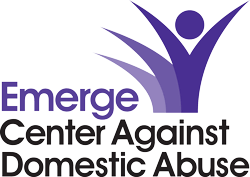Full-time/Benefits Eligible
Tuesday-Saturday 3:00 pm – 11:30 pm*
Bilingual (English/Spanish) Required
Pay Rate: $60,040/year (not negotiable)
*Flexibility is needed to work outside of this schedule to assist with time-sensitive matters and to be on-call for emergencies.
Emerge Center Against Domestic Abuse has begun an organizational process of transforming philosophy and practice to acknowledge the root causes of violence as being embedded in multiple, intersecting systemic oppressions (sexism, racism, homophobia, transphobia, classism/poverty, able-ism, and anti-immigrant sentiment).
These conversations directly impact the climate and culture of our organization and are tied to the climate and culture in our community related to violence as a normalized experience. We are seeking team members across the organization who understand that humanizing the experience of all people is a radical act in a non-profit system and who are willing to be a part of transforming our organizational culture to be a more antiracist multicultural institution.
We are seeking job applicants who understand it is our responsibility to ensure that our responses to domestic abuse must include the experiences of those who are most in need and who have the least amount of access to help and support and who can work in an environment that is rapidly changing.
We’re committed to making our community a safer place for everyone. Join us!
POSITION OVERVIEW
The Bilingual Clinician for Emergency Services will play a critical role in supporting survivors of domestic abuse by providing trauma-informed and equity-centered care. Your primary responsibility will be evaluating and assessing participants seeking shelter-based services for domestic abuse, enrolling them in services, and providing continuous support throughout their shelter stay. Collaborating closely with shelter Navigators, you will offer a clinical perspective and intervention based on participants’ lived experiences, identities, acuity, and specific needs.
In this role, you will utilize innovative approaches and employ creative problem-solving techniques to contribute to the liberation and healing of survivors of domestic abuse within a shelter setting. Your work will be guided by our values, aiming to create a safe and empowering environment for all participants.
Essential Duties and Responsibilities include the following. Other duties may be assigned to meet business needs.
RESPONSIBILITIES COMMON TO ALL AGENCY EMPLOYEES
- Commits to upholding the agency’s mission, vision, community guidelines and values. We value diversity, inclusion, equity, and belonging in all that we do.
- Engages in radical service to, and acceptance of, staff and participants as they are by committing to showing up with integrity and love and encouraging all to use their power to affect change.
- Commits to creating and maintaining a safe, equitable, trauma-informed, and healing work environment for all participants and staff members.
- Commits to a culture of understanding how our collective actions affect participants’ efforts to regain their independence and rebuild their lives.
- Assesses potential crisis situations responding to, and accurately documenting, in an equity-centered and trauma-informed manner while notifying appropriate personnel as soon as possible.
- Follows all protocols and practices of Emerge programs, as well as all city, county, state, and federal rules.
- Displays an ability to identify problems and generate a range of solutions utilizing creativity, collaboration, open communication, and critical thinking skills.
- Champions the organization’s culture of feedback by consistently providing and seeking feedback and encouraging others to do the same.
- Maintains confidentiality of shelter sites and information pertaining to all staff, participants, and visitors.
- Dedicated to personal development, furthering knowledge, services, and approaches to better meet the needs of participants and staff.
- Strives for innovation incorporating new tools, practices, and mindsets that support relationship building, rest, restoration, and healing; not only for collective liberation but also for our individual wholeness, freedom, and ability to thrive.
- Attend all meetings and trainings as required.
ESSENTIAL DUTIES
- Builds relationships with participants that lead to a thorough awareness of each person’s lived experience, intersectional identities, needs, personal background, strengths, and pain, as well as how systems of power and privilege affect those experiences.
- Conducts an intake and equitable assessment of program participants and integrates clinical judgment, and observational data to formulate an appropriate case plan.
- Creates a case plan that prioritizes the participants’ safety, autonomy, and empowerment and considers all their needs, particularly housing, emotional health, physical health, and long-term support.
- Implements the Critical Time Intervention (CTI) case management model, assesses risk, provides safety planning, emotional support, and education surrounding domestic abuse to all participants.
- Leads and ensures that the case management approach is equity-centered, trauma-informed, and considers intersectional identities, historical trauma, individual needs, and engagement throughout the shelter experience.
- Provides sessions to participants in Emergency Services to assess how participants’ case plans are progressing toward their goals and objectives.
- Works in collaboration with shelter Navigators to support participants in meeting their case management goals.
- Completes a housing assessment to gain a better understanding of the participant’s particular preferences, circumstances, challenges, and strengths, which will guide the shelter Navigators as they assist the participant in their search for housing.
- Participates in co-facilitation of Emergency Services case staffing meetings and provides clinical perspective and support in building an understanding of each program participant’s lived experience and identities, needs, history, strengths, and pain in a holistic assessment process.
- Identifies participants’ precipitating factors or symptoms and underlying problems that may lead to the onset of a behavior, problem, issue, or crisis to emerge.
- Assists participants in maintaining a clean and tidy living space, considering the impact that trauma can have on their ability to do so. This may entail working together to identify any challenges or barriers, providing support and practical tools, and prioritizing their safety, respect, and empowerment.
- Tracks and meets with high acuity participants to ensure timely and appropriate follow-up and support is provided by shelter team.
- Assesses potential crisis situations and takes appropriate trauma-informed preventative and/or responsive actions.
- Assesses and evaluates callers requesting emergency shelter assistance due to near lethal or high-risk incidents of domestic abuse.
- Facilitates groups while upholding a trauma-informed and equity-centered environment ensuring that the needs and wants of participants are honored.
- Ensures comprehensive and precise documentation of participant services by completing all clinical documentation in a timely manner and maintaining accurate records in the Client Track database.
- Assists direct service staff in identifying the signs of compassion fatigue and in debriefing challenging calls or sessions.
- Engages in ongoing professional development and self-reflection to deepen understanding of equity, trauma, and the complex intersections of identities and experiences that participants and staff bring to the partnership.
- Responds to callers on the crisis line.
- Rotates on-call Clinician responsibilities.
REQUIRED EXPERIENCE AND QUALIFICATIONS – Any combination of at least 5 years of work, professional or life experience (personal), in the following areas:
Note: Emerge recognizes that the required skills and knowledge needed for this position can be derived by formal professional experience as well as other life experience outside of a professional setting. Qualified applicants will be asked to make a direct connection between their work or life experience and the required qualifications below. We also value the added foundation that formal education can provide, however, any years spent in an educational institution will not count directly toward the number of years required or preferred.
- Experience providing clinical services to individuals and/or families.
- Experience of individual or organizational work to support and advocate for survivors of gender-based violence.
- Knowledge of the dynamics of domestic abuse and/or sexual violence
- Demonstrate clinical knowledge of the ways that trauma and lived experiences might affect a survivor’s capacity to engage with services, as well as the manifestations of trauma (e.g., co-occurring issues including substance abuse, suicidal ideation, behavioral/mental health concerns)
- Demonstrate a trauma-informed understanding and practice in working with trauma-based reactions/behavior (particularly during escalated situations/conversations) that prioritizes remaining grounded, remaining emotionally regulated, and centering love and safety.
- Demonstrate knowledge and practice working with how gender identity, race, class, ability and sexual orientation and other cultural factors and/or identities intersect with issues of gender-based violence.
- Demonstrate willingness and ability to confront racist, homophobic, transphobic behavior/comments in any setting.
- Ability to build authentic relationships with team members, supervisors, and program participants through practices such as curiosity, vulnerability, active listening to gain deeper understanding, and giving and receiving feedback.
- Ability to examine your own power, privilege and/or oppressions to work in service of all survivors.
- Ability to function in a shelter setting and navigate complex systems with a focus on problem solving and adaptability.
- Ability to communicate, both written and oral, clearly, and concisely. Proficient computer skills including e-mail, calendars, and participant data system.
- Experience working in the nonprofit human services field.
- Required: Bilingual (English/Spanish)
REQUIRED COMPETENCIES
- Able to demonstrate equity-centered and values-based leadership that guides decision-making and inspires others to do the same.
- Knowledgeable in the techniques used to plan, implement, and evaluate programs or initiatives.
- Ability to work well independently and be self-motivated.
- Proficient computer skills including e-mail, calendars, document processing, spreadsheets, and databases.
- Able and willing to travel within a designated service area for work.
OTHER REQUIREMENTS
- Ability to obtain appropriate fingerprint clearance through the Arizona Department of Public Safety
- Ability to obtain CPR/First Aid certification
- Valid Arizona Driver License and proof of automobile insurance (as applicable)
PHYSICAL DEMANDS
- Must be able to sit or stand during an 8–10-hour workday.
- Must be able to lift twenty-five pounds.
Emerge is an equal opportunity employer

